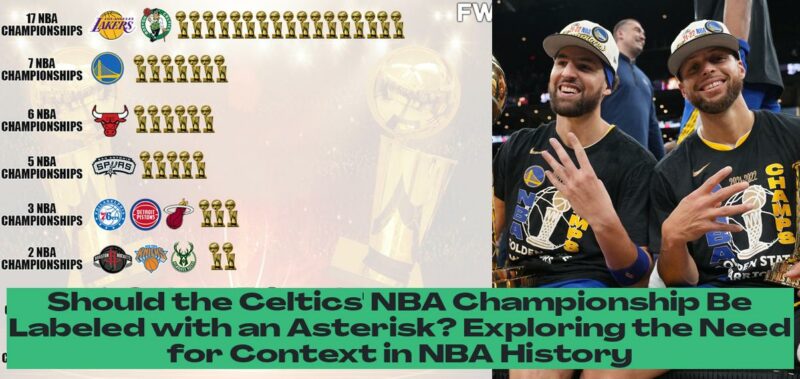The Celtics Championship Needs an Asterisk — But So Does the Rest of NBA History
The Boston Celtics, with their 18th NBA championship, are now the undisputed kings of the league, surpassing the Los Angeles Lakers’ long-standing 17 championships. However, a debate has sparked among basketball fans: should this title come with an asterisk? Some argue that the Celtics’ path to the championship was paved with an easier-than-expected run, particularly when compared to the challenges faced by other teams in previous eras. This argument raises a critical question: do all NBA championships hold equal weight, or is there a need for a more nuanced understanding of the historical context surrounding each title?
The argument for an asterisk on the Celtics’ championship stems from the perception that the 2023-2024 season lacked the same level of competition found in previous years. The Celtics, as the preseason favorites, dominated the regular season, showcasing their dominance with seven more wins than any other team. Their playoff run was marked by a smooth progression, ultimately culminating in their victory over the Dallas Mavericks. This seemingly effortless journey has led some to believe that the Celtics’ championship lacks the same gravitas as those won in earlier eras.
However, this argument conveniently forgets the complexities of NBA history. Throughout the league’s existence, various factors have impacted the strength of competition. The 1999 and 2012 seasons, for instance, also faced criticism for their perceived lack of competition, yet these championships are not typically marked with an asterisk. The truth is that every NBA championship, regardless of the era, is a testament to the skills, dedication, and resilience of the winning team. The Celtics’ championship, despite the criticisms, reflects their ability to overcome challenges and emerge victorious.
The real issue lies not in the legitimacy of the Celtics’ championship but in the broader context of NBA history. Every championship should be celebrated, but it’s crucial to acknowledge the unique circumstances surrounding each title. The NBA’s landscape has evolved over the decades, with changes to rules, player development, and globalized talent influencing the strength of competition. Instead of solely focusing on the Celtics’ championship, the conversation should shift to a more comprehensive understanding of NBA history, recognizing the nuances and challenges faced by teams across different eras.
- The debate over whether the Celtics’ 18th NBA championship should come with an asterisk stems from the perceived lack of competition in the 2023-2024 season.
- While some argue for an asterisk on the Celtics’ title, it’s essential to recognize that various factors have historically influenced the strength of competition in different NBA seasons.
- Each NBA championship, including the Celtics’, is a testament to the winning team’s skills, dedication, and resilience, regardless of the era’s challenges.
- Celebrating every NBA championship is crucial, but understanding the unique circumstances surrounding each title is equally important in appreciating the league’s history.
- The evolution of the NBA landscape over decades, including rule changes, player development, and global talent impact, has shaped the level of competition in different eras.
The Unseen Asterisk: The Global Talent Pool
One factor that often goes unacknowledged is the impact of the global talent pool on the NBA. Prior to the 1980s, the NBA was predominantly a domestic league, with limited international participation. This meant that the league’s best players were primarily drawn from a smaller pool of talent. However, as the league expanded its global reach, attracting players from countries like Argentina, Germany, and Australia, the level of competition intensified.
This influx of talent from a wider pool made the NBA more competitive and unpredictable. The addition of players like Dirk Nowitzki, Tony Parker, and Manu Ginobili, all of whom played a significant role in their respective teams’ successes, transformed the league’s landscape. These players, along with many others, brought a new level of skill and athleticism to the court, elevating the game to unprecedented heights.
The global talent pool has not only increased the overall skill level of the NBA but has also impacted the dynamic of team play. The emergence of international players has forced teams to adapt their strategies and tactics, embracing different playing styles and incorporating international influences into their game plans. This shift has made the NBA a more diverse and exciting league, but it has also made it challenging to compare championships across different eras.
The argument for asterisks on past NBA championships stems from the idea that teams from earlier eras might not have been able to compete against the current level of talent. While this perspective is understandable, it’s important to acknowledge that the NBA has always been a league where great players and teams have risen to the occasion. Just as the Celtics faced challenges in their 2023-2024 championship run, past teams also faced their own unique obstacles and competition.
The Era of Julius Erving: A Defining Moment
The era of Julius Erving, also known as “Dr. J,” stands out as a pivotal moment in NBA history. His arrival in the NBA in 1976, after a successful stint in the ABA, marked a turning point in the league’s evolution. Erving, with his electrifying playing style and unmatched athleticism, brought a new dimension to the game, influencing the future of basketball and inspiring generations of players.
His dominance in the ABA, where he won three MVP awards and led the Philadelphia 76ers to three championship titles, served as a testament to his exceptional skills. His arrival in the NBA, combined with the league’s merger with the ABA, brought a surge of talent and athleticism, elevating the standard of play. Erving’s impact on the league was undeniable, pushing the boundaries of the game and shaping the NBA’s future trajectory.
Erving’s influence can be seen in the development of future generations of players. His acrobatic dunks and creative scoring techniques inspired countless young players, leading to a new era of athleticism and skill in the NBA. Erving’s legacy continues to resonate in the league, serving as a reminder of the impact of individual players on the game’s evolution.
The Importance of Context: A Nuance Perspective
The Celtics’ championship may be a source of debate, but it’s important to approach NBA history with a nuanced perspective. Instead of focusing on asterisks and comparing championships across different eras, we should celebrate the achievements of each team within their respective contexts. Every championship is a testament to the hard work, talent, and dedication of the players and coaches involved. The Celtics’ victory should be acknowledged as a significant accomplishment, recognizing their dominance in the 2023-2024 season.
The NBA’s history is rich with stories of triumph and adversity, and every chapter deserves to be appreciated for its unique context. Instead of seeking to diminish the achievements of any team, let’s celebrate the evolution of the league, acknowledging the impact of different eras, player development, and global talent on the game we love. The NBA’s legacy is not defined by asterisks but by the remarkable stories of players, teams, and championships that have shaped the game’s history.
The Celtics’ championship is a testament to their strength and resilience, and it deserves to be celebrated. However, it’s essential to remember that every championship holds a unique place in NBA history, reflecting the challenges and triumphs of its era. Let’s embrace the nuances of the game’s evolution, appreciating the stories and achievements of every team and player, without resorting to asterisks or diminishing the significance of each championship.









